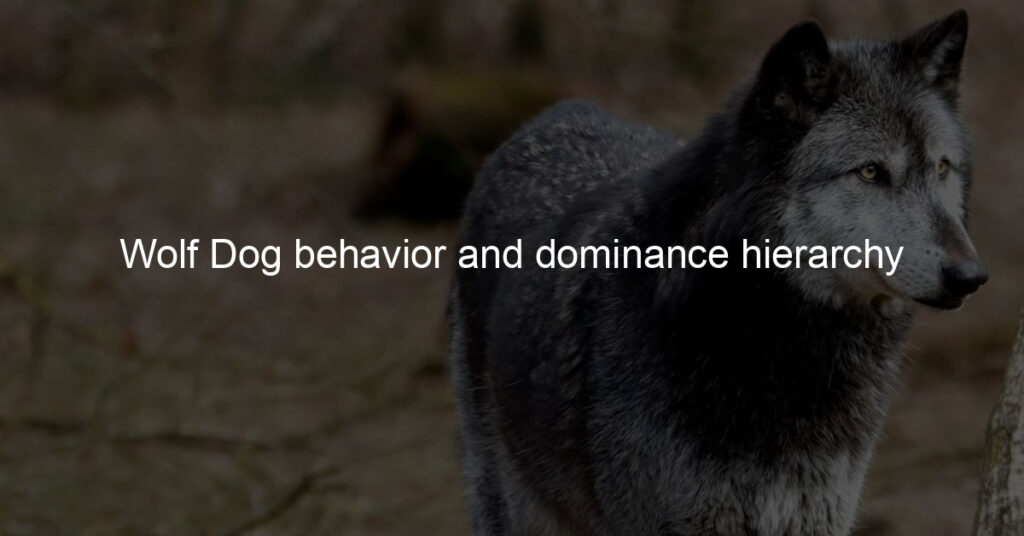Are you the proud (or perhaps, beleaguered?) owner of a wolf-dog? If so, you’ve probably heard some pretty wild stories about their behavior – from howling all night long to running away in search of new adventures. But have you ever wondered if there is more to your wolf dog’s unpredictable and dominant personality than meets the eye? We are here to tell you that there is!
Wolf dogs express their dominance differently than other domestic pets because they have a unique heritage; understanding what’s behind those behaviors can help us navigate our relationships with these incredible animals. In this blog post, we will examine wolf dog hierarchy and communication styles, decode dominant tendencies and learn why establishing yourself as the strong leader in your pack is essential for maintaining harmony between you and your furry friend.
What is the dominance hierarchy in wolves?
Wolves are social creatures and maintain a strong hierarchical structure within their pack, known as the dominance hierarchy. The alpha pair has priority for breeding and the most food resources, creating a hierarchy in which lower-ranking wolves submit to higher-ranking members of the pack.
Wolves also exist outside these hierarchies among family groups; for example, siblings may play and interact without being concerned about rank. Since wolves exist in close-knit packs, the relationship between each wolf is key to its success; thus, understanding their dominant hierarchy is pivotal to the successful communication and management of the group.
Are wolf dogs territorial?
Wolf dogs are a unique canine hybrid that tends to confuse people when it comes to their behavior. Most wolf dog owners know one thing for sure; they require more attention than the average pet dog. Are they territorial? Yes and no, depending on the particular animal’s personality.
Generally speaking, wolf dogs may be less territorial than your typical domesticated pup, but you should still exercise caution to not startle them or cause them to become aggressive. They have been known to show territorial behavior if their home or family is threatened.
Ultimately, it is important to socialize your wolf dog while they are young and give them plenty of positive reinforcement and love to ensure these animals feel safe and secure in any environment.
What is the temperament of a wolf-dog?
Wolf dogs have unique personalities; they may look like wolves, but when it comes to temperament, they take after their domestic dog lineage. Generally friendly, these hybrid dogs can be inquisitive and willing to please when well-trained and socialized. Though strong-minded, wolf dogs are not necessarily aggressive as long as their owners think ahead and exercise proper control from the start.
It’s important to remember that while they do make wonderful pets, they do still require more training and attention than many other breeds; this is due to their special needs as a crossbreed. All in all, if provided with proper support and guidance, wolf dogs can be gentle, loyal companions who add a special spark to any home or family dynamic!
How do you discipline a wolf dog?
Wolf dogs are unique in that they inherit the instinctual nature of wolves, so disciplining them can be both a challenging and rewarding experience. Training a wolf-dog requires understanding their behavior, as well as patience and consistency. Successful discipline begins with earning the wolf dog’s respect by setting rules and boundaries and enforcing them gently.
Rewarding good behavior while providing corrections for bad behavior is also essential in ensuring that your wolf dog learns how to behave properly. Use positive reinforcement whenever possible as it encourages your wolf-dog to not just conform, but thrive in its environment.
Summary: Wolf Dog behavior and dominance hierarchy
To summarize, wolf dogs are a unique breed and have distinct behavior that should not be ignored. Before bringing one into your home, it is important to do your research to understand the prospect of living with one.
Understanding how the dominance hierarchy works is necessary for maintaining order in the household and establishing a healthy relationship between humans and wolves. It can take weeks or months for wolf dogs to adjust to their new environment, so having patience and consistency during this time is key.
Wolves are loyal animals that require plenty of attention and care, so caring owners should make sure they have enough resources on hand to provide enrichment activities. By following these steps, you can ensure that your wolf dog pack will thrive!








